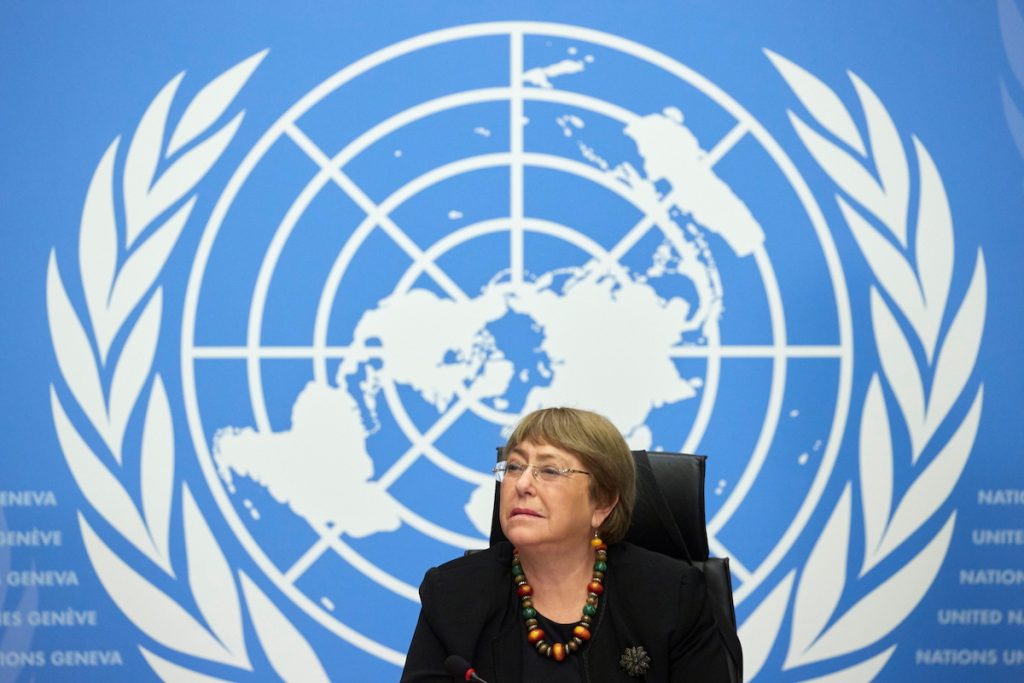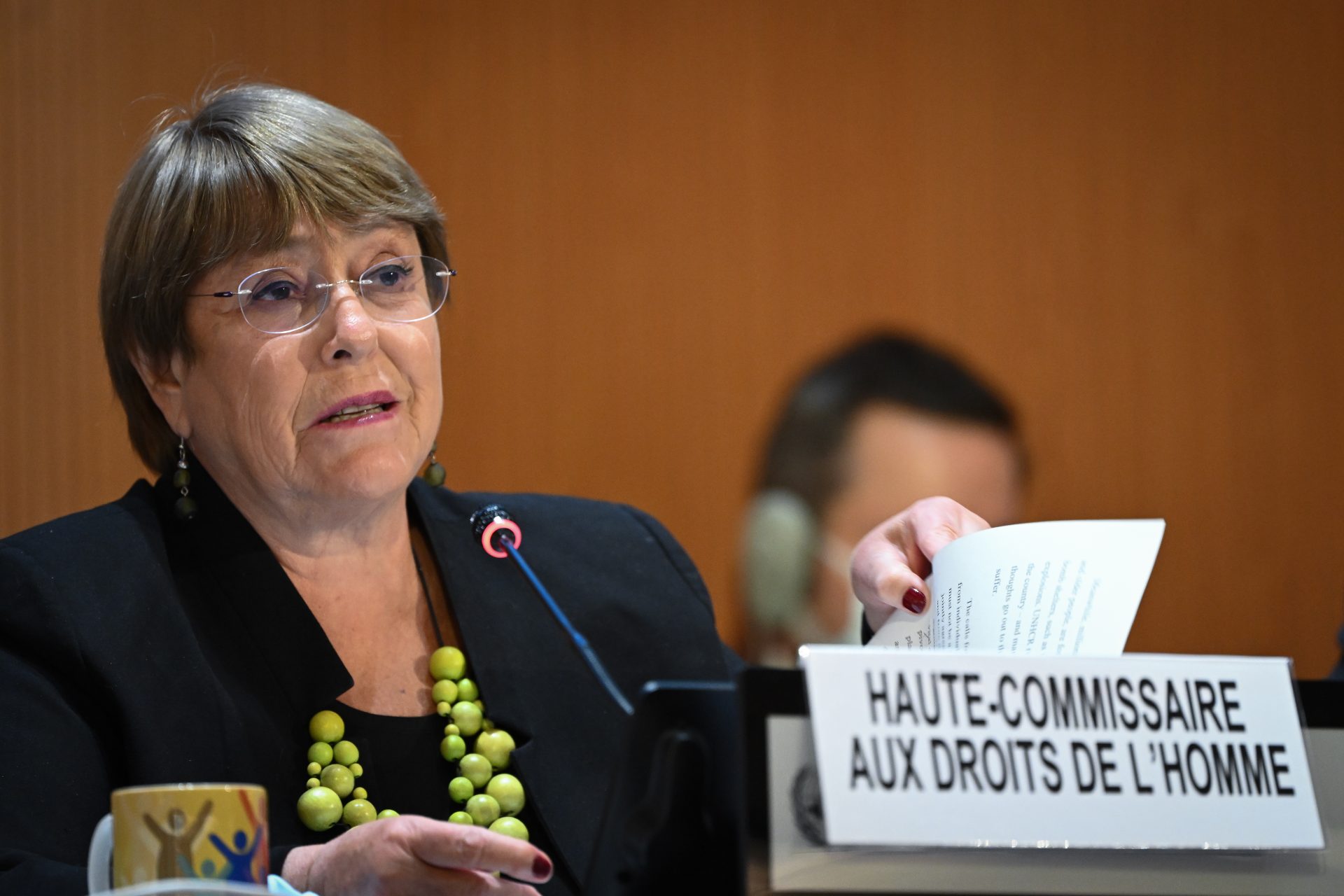A Uyghur rights group expressed “serious disappointment” in the outcome of U.N. Human Rights czar Michelle Bachelet’s trip to Xinjiang, which it said had amounted to “a propaganda opportunity for China to whitewash its crimes against humanity and genocide against the Uyghur people.”
Ahead of the visit last week, rights groups demanded assurances that the United Nations High Commissioner for Human Rights would have unfettered access to the region and the ability to speak freely with Uyghurs without fear of reprisal. Otherwise, they warned, her trip risked lending legitimacy to Beijing’s justification for a “counter-terrorism” campaign that has seen as many as 1.8 million members of the ethnic minority held in a network of internment camps since 2017.
During a news briefing at the end of her six-day trip to China on Saturday, Bachelet said she was not in China for an official investigation of the situation in the Xinjiang Uyghur Autonomous Region (XUAR), although she claimed to have had “unsupervised” access to sources that the U.N. had arranged to meet in the region.
She added that she had urged China to avoid “arbitrary and indiscriminate measures” in its crackdown in the XUAR and said officials in the region had assured her that the internment camps they call “vocational training centers” have been dismantled.
But RFA and other outlets have reported in the run up to the visit that China put pressure on Uyghurs in Xinjiang and their relatives abroad to stop them from speaking about internment camps and other abuses in the region.
In a statement from Germany, World Uyghur Congress (WUC) President Dolkun Isa warned that Bachelet’s visit – the first by a U.N. rights czar in nearly two decades – only strengthened China’s narrative about its policies in the region, which Western nations say amount to a genocide of the Uyghur people.
“As expected, the High Commissioner has wasted a historic opportunity to investigate the Uyghur genocide and deliver justice to the Uyghur people,” Isa said.
“The High Commissioner has ruined her office’s credibility by aligning with China’s wishes and conducting a visit that by no means adequately addressed justice for Uyghurs and accountability for those responsible.”
The WUC said that a recently released police list with the names of more than 10,000 allegedly detained Uyghurs known as the Xinjiang Police Files underscore exactly why an investigation into the situation in the XUAR is needed and urged Bachelet’s office to release her independent assessment “as a show of willingness to hold the Chinese government accountable for crimes against humanity and genocide being committed.”
Bachelet’s visit was also slammed by German researcher Adrian Zenz, director in China studies at the Victims of Communism Memorial Foundation in Washington, D.C., who posted a message on Twitter saying that the result was “significantly worse than what had been feared.”
“The perhaps worst human rights violation of our time is treated as a matter of internal review by the perpetrator,” he tweeted.
“The main takeaway is that Bachelet treats the Xinjiang government as a rational actor who should undertake its own ‘review’ of how its ‘deradicalization’ policies may not be complying with international standards,” the researcher wrote, calling the U.N. official’s press briefing “absolutely stunning.”

Call for stronger measures
The end of Bachelet’s trip came as the WUC convened a May 26-28 summit in Munich, Germany on best practices for advocacy efforts, which Isa opened by urging the global community to adopt stronger measures if it intends to hold Beijing to account for its treatment of Uyghurs in northwestern China.
In a speech to more than 200 policymakers, activists, lawyers, and members of the Uyghur diaspora gathered for the summit – held just a half-hour’s drive from the former Dachau Nazi concentration camp – Isa welcomed the international attention that the Xinjiang Police Files had drawn to the situation in the XUAR.
But he warned that compiling evidence of China’s policies targeting the Uyghurs is only part of what must be an urgent and concerted international effort to end atrocities in the region.
“The ‘Xinjiang Police Files,’ as they are called, remind the world of the nature of the Chinese government’s atrocity crimes and genocide of the Uyghurs,” Isa told those in attendance at the conference hall.
“For us [Uyghurs], this is not breaking news – it is the daily reality of our lives … Millions of Uyghurs are being detained in 21st century concentration camps, where they are subjected to all forms of abuse – torture, rape, sexual abuse, forced labor, [and] sterilization.”
While the U.S. government and the parliaments of several Western nations have declared that the situation in the XUAR constitutes genocide, the only action taken against China to date has come in the form of sanctioning Chinese officials and businesses seen as complicit in the policies.
In early December, the Uyghur Tribunal, an independent people’s tribunal in London, determined that China has committed genocide and crimes against humanity against Uyghurs and other ethnic minorities in Xinjiang, although its findings are non-binding and lack state-backing.
Meanwhile, more than five years since the establishment of the camps, little has changed for Uyghurs in the XUAR. Authorities in the region use a high-tech and comprehensive surveillance system to monitor for any sign of opposition to Chinese rule, which increasingly includes any outward expression by Uyghurs of their traditional culture, such as dress, language, and religion.
Isa said the onus is on global powers to demand that Beijing change course or face consequences.
“Over the past five years, all Uyghurs, Kazakhs, [and members of the] diaspora have tried to find any information about the whereabouts and well-being of our families in the homeland. What we have learned in these five years should already have shocked the world’s conscience,” he said.
“With the Xinjiang Police Files being yet another reason, [the WUC] calls on the international community to end its ‘business as usual’ approach to China.”

Forced slavery laws
Legal experts at this week’s summit said new laws prohibiting the trade of goods made with forced labor could be used to make China to rethink its policies in the XUAR, where Uyghurs held in internment camps are often put to work in factories for little or no pay.
During a panel on “Genocide Prevention and the Responsibility to Protect,” Nick Vetch, the Vice-chair of the Uyghur Tribunal, called for a convergence of legal, political, and business interests, which he deemed “critical” to influencing Beijing.
“The pact that [the Chinese Communist Party and the State] has made [with the people of China] is that they will not be governed by the rule of law, but by the law of rule,” he said.
“And the reason that the people have accepted this, and why it is sustainable for the Party and the State, is because the pact is that the State will provide them with stability, it will provide them consumer goods, it will provide them with a degree of wealth and well-being, in return for which they subdue their political instincts.”
Vetch, who is the executive chairman of the U.K.-based Big Yellow Group, likened threats to China’s economic stability to attacks against its political integrity, noting that in the past, such actions have led to “responses which are powerful and visceral and very acutely delivered.”
“In my view, business is the most powerful force on the planet … and how business behaves will have a profound bearing on how China behaves,” he said, noting that laws such as the U.K.’s Anti-Slavery Act explicitly prohibit the sale of goods procured through slave labor and should be used to influence policies in the XUAR.
He gave the example of solar panels, which are increasingly critical as countries around the world work to come in line with regulations governing power production amidst climate change.
“If 85 percent of the world’s production of solar panels is made by China and we cannot verify the source of it, but we believe – as we have seen the evidence and we know – that it is illegally sourced, that means that … governments throughout the Western world and elsewhere, the biggest corporations on the planet, are using illegal products,” he said.
“So, the law exists, the politicians have made the law, they’ve created the framework, it just needs to be enforced now.”
Vetch said that such situations also present opportunities for the business world by taking away China’s ability to offer the cheapest goods, which it has done using forced labor.
“If you take that imperative away, you rebalance the economics and you create an incentive for business to … generate new markets,” he said, adding that in addition to solar panels, the markets for cotton and tomatoes could provide similar leverage.
The Uyghur community must convince businesses to work with politicians and legislators to enforce such laws, Vetch said, and in doing so “raise the price of the behavior” of the Chinese government.
A ‘heavy responsibility’
Geoffrey Nice, the chair of the Uyghur Tribunal, agreed that it is critical for the Uyghur community to investigate new ways to force change from China.
“Nine individuals with no special interest decided that the question of what was happening to the Uyghurs should be looked at dispassionately, objectively, according to the strictest evidential tests, and that a judgment should be returned, saying what has happened, what is happening and what may happen, and that is what we did,” he said of the tribunal’s December ruling.
But he warned that such pronouncements – as well as the declarations of genocide by Western lawmakers – are merely tools to be used by the Uyghur community in a wider influence campaign.
“Be under no illusion – even if 10 other powerful nation states pronounced that what is happening in Xinjiang is genocide, the problem would not be over,” he said.
“On the World Uyghur Congress and all other Uyghur groups rests an enormously heavy responsibility … for saving an ethnic group that is your relation on the far side of the globe from killing, from all known forms of persecution, from forced assimilation of one group into another, from destruction of a culture, loss of a language, and annihilation of an identity.”
Copyright © 1998-2020, RFA. Used with the permission of Radio Free Asia, 2025 M St. NW, Suite 300, Washington DC 20036.







